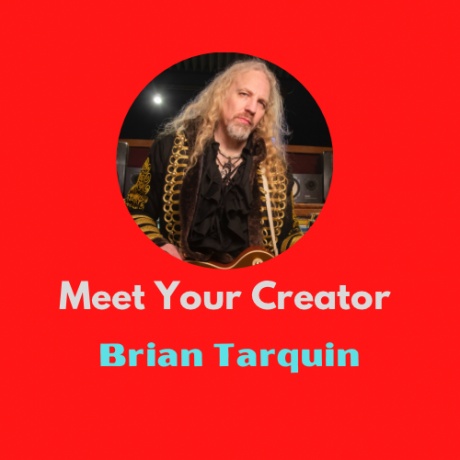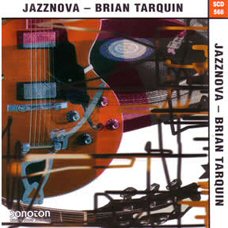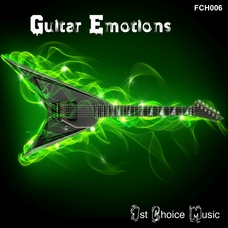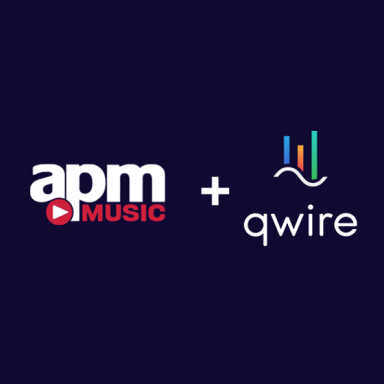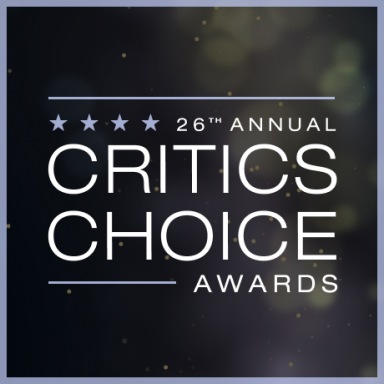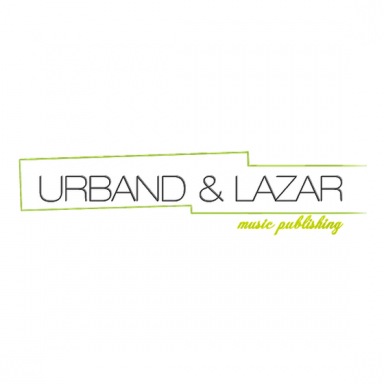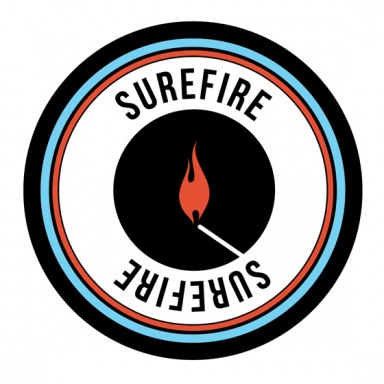Meet Your Creator: Brian Tarquin
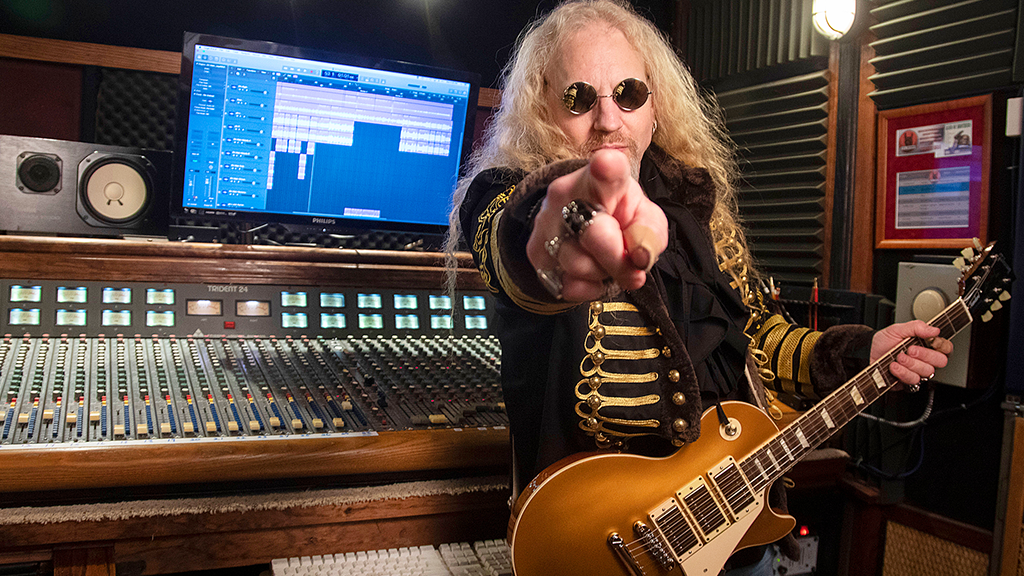
By Ted Reyes
On January 1, 1962, The Beatles, fresh from their grueling residency in Hamburg, traveled to North London with their manager Brian Epstein to secure stardom through a live audition set for the executives at Decca Records. The band played 15 songs for their 'commercial test' and, as history recorded it, was rejected by Decca with one of the most infamous disses in music history: "Guitar groups are on the way out."
Of course, the statement was a false prediction. The Beatles happened and ushered in a tremendous onslaught of guitar-based music that changed the world.
Fast forward to the 21st century, the "Decca Phrase" somewhat returned to haunt guitar-wielding artists because it doesn't take much to see or hear that popular music today is almost devoid of guitar groups.
We spoke to Brian Tarquin, a multi-Emmy award-winning guitarist/composer and author whose latest album "Brothers in Arms" is ruling the Metal Contraband Radio Charts. He is one of the most influential guitarists of our time – one who has worked with some of the best in the business, from Joe Satriani to Vinnie Moore to Jeff Duncan. Brian is also a staunch advocate of the plight of our women and men in the armed forces, to whom Brothers in Arms is dedicated to. Brian has over ten albums in the APM Music catalog under Sonoton, 1st Choice Music, including Jazzy Soulful Grooves and Jazznova.
We had a fantastic conversation with Brian and talked about his new album, his collaborations with the best of the best, his recording and guitar setup, his advocacy, and the state of guitar music.
Tell us about your latest album, Brothers in Arms. Is this a sequel to Guitars for Wounded Warriors? How did this come about?
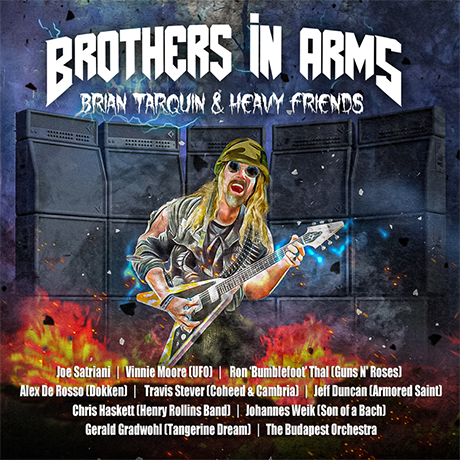
Brian: Yes, it is a sequel to the Guitars for Wounded Warriors. I'm always trying to outdo myself with composing and guests on my records. I started the project before the Pandemic, doing a lot of pre-production, like composing and recording basic tracks. Then during the lockdown of 2020-21. I was speaking with a lot of the guests and going full bore on recording and production. I always wanted to work with one of my heroes Joe Satriani and this album gave me the opportunity. This project also had me work with other world-class shredders I hadn't before, like Vinnie Moore of UFO and Jeff Duncan of Armored Saint. Because I'm a guitar instrumentalist, I always have to make sure the message comes across in the music. That's why I hand-pick the guests for each track. All the guest guitarists are seasoned instrumentalists as well, which makes it a perfect fit.
How did you record this album?
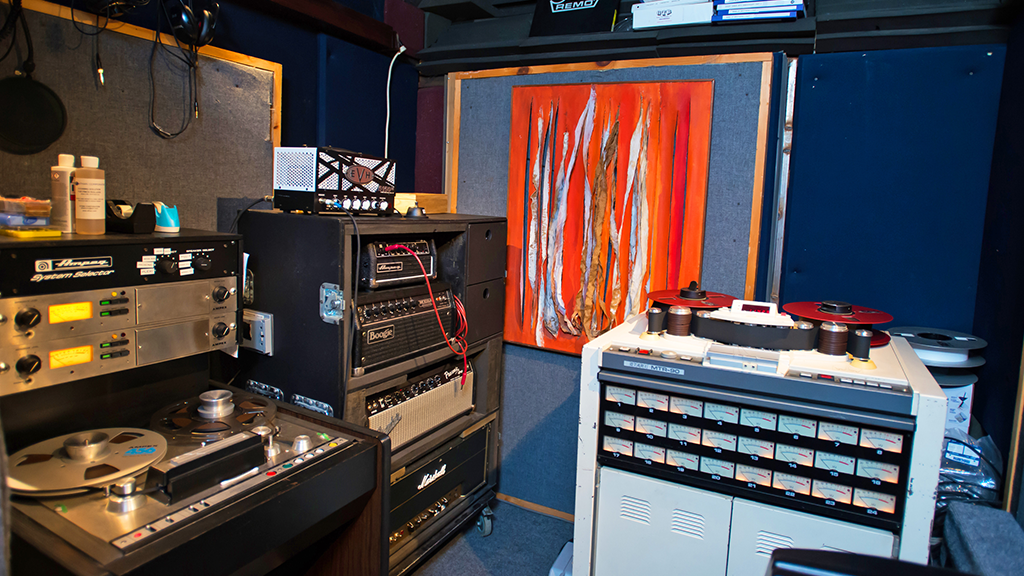
Brian: I have a very unique mobile recording studio called Jungle Room Studios housed in a 28-foot custom-made trailer. It was designed in Southern California and equipped with two separate rooms, a live room, and a control room. The studio features a modified 1986 British Trident 24 recording console, an Otari MTR 90 2" Analog Tape Machine, an Ampex 440c 1/4" 2 track analog tape machine, and a variety of classic outboard gear such as the Neve Compressor 33609, Rupert Neve Designs Portico II Master Buss Processor, Neve 1074, Chandler ltd Germanium Compressor, and a host of other gear.
Incredible! Analog warmth all the way through! Since this is a guitar album, amplifiers are critical. Any particular setup you want to share?
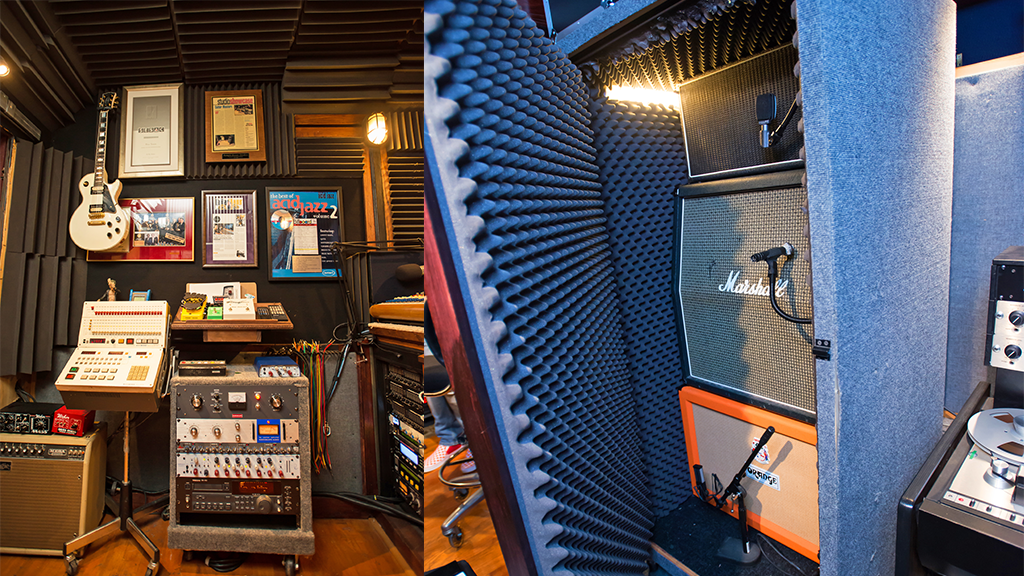
Brian: I used real tube guitar amplifiers on the recording of this album, no "I Can't Believe It's Not Butter" amp simulator plug-ins. For example, 1969 Fender Super Reverb, Marshall Plexi Head with Mark Cameron Modified High Gain, 1984 Marshall JCM800 2x12 combo, 1979 Mesa Boogie Mark IIb 1x12 combo, Rivera Quiana Studio 1x12 combo, Fender Prosonic head, EVH 5150 III head, 1985 Mesa Boogie Mark III head, and a Mesa Boogie SOB head. I have an amp switcher that enables me to switch between any given amp head to any given speaker enclosure in a custom-made isolation booth I built in the studio. The booth contains a 1975 Marshall 4 x 12" cabinet with vintage Celestion 30's, 2014 Orange 2x12 cabinet with Vintage 30's, and an Ampeg MICRO-CL Bass Stack.
What about the guitars and pedals?
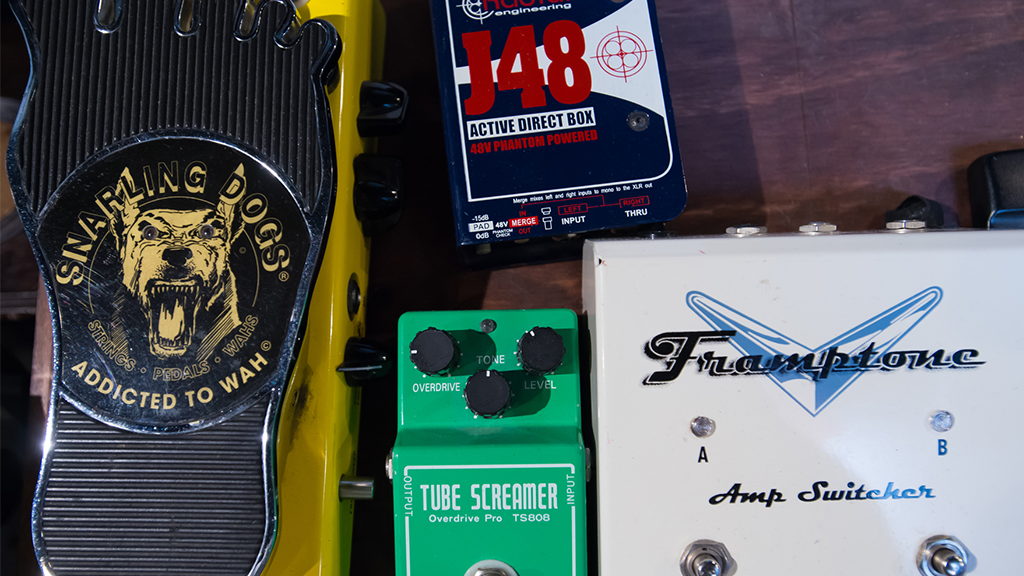
Brian: Guitar wise I used my 2020 Gibson Les Paul Standard Goldtop Triple Burstbucker pickups, 2020 EVH Striped Series Shark Burgundy, 2020 Fender Jimi Hendrix Stratocaster Signature with Seymour Duncan Hendrix Signature Pickups, 2019 Fender Jeff Beck Signature Strat, 1997 Gibson Les Paul Custom Shop, 1978 Gibson Les Paul Goldtop Deluxe, 1983 Kramer Baretta super Strat, 1999 Guild Acoustic DCE 1 guitar with L.R. Baggs Dual Source Microphone pickups, 1998 Ovation Celebrity 12 string and an SG I hand made over the Pandemic out of a mahogany wood block. I installed a Whole Lotta pickup in the bridge position and a Pearly Gates in the neck position. It sounds fantastic, conjuring up those classic Jimmy Page tones on the track "Hounds of Hell." As for basses, I used a 1989 Yamaha Attitude, 2020 Custom Rickenbacker 4003 Bass, and a 2012 Ibanez 8 String RGA8.
As for pedals, I used a Dunlop Univibe, Snarling Dogs Super Bawl Whine-O Wah, Snarling Dogs Mold Spore Wah, Morley Classic Wah, Dunlop Talkbox, Tech 21 YYZ Geddy Lee Signature SansAmp, Keeley Ibanez Tube Screamer TS 808, EVH MXR Phase 90, DigiTech Whammy Pedal.
How did you record your guitars?
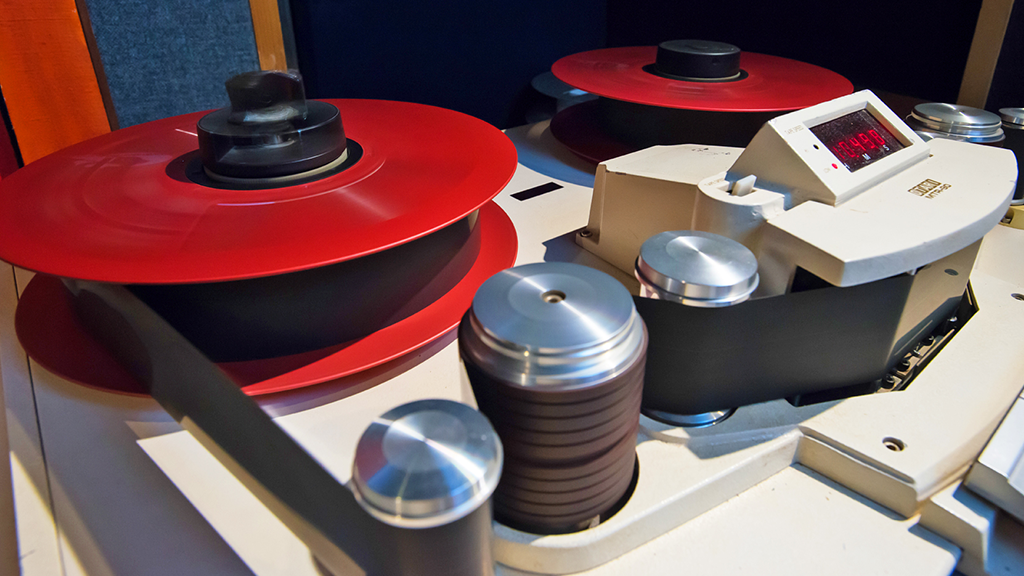
Brian: I used the following microphones to record the amps, some in a live room and some in the amp booth. Beyerdynamics M160 Ribbon, Royer R101, SE Voodoo VR-1, Sennheisser 609, Electro Voice RE20 Cardioid Dynamic, Sennheiser MD-421, SE Z5600a II Tube Microphone, SE RT1-Ribbon Tube Microphone, AKG D112 Large Diaphragm Microphone. However, one of my favorites has always been the Beyerdynamics M160 Ribbon for amps for its clarity and durability. I have blown many a ribbon, putting it in front of a Marshall cabinet.
At the center of the studio is a modified 1986 Trident 24 Series 28 channel 24 bus w/TT patch bay with a custom-made GMPS 18 Power Supply. I have all of the outboard gear hard-wired into the Trident's patch bay. So, for guitars, I used the BAE 1073 Mic Pre with 1084 EQ section for the microphones and then patched directly into the Otari MTR 90 - 24 track 2" Analog Tape Machine. Sometimes I would use the Trident's built-in preamps as well, depending on the track. I would not compress going to tape, but during mixdown, I used the Rupert Neve 5043 Duo Compressor/Limiter on the rhythm guitar tracks and melodies. Another favorite compressor is Chris Yetter's Audio Scape 76A Compressor & Audio Scape 6386 EDITION V-COMP MU.
You mentioned that you love recording on analog gear. What about editing? Did you cut tape too?
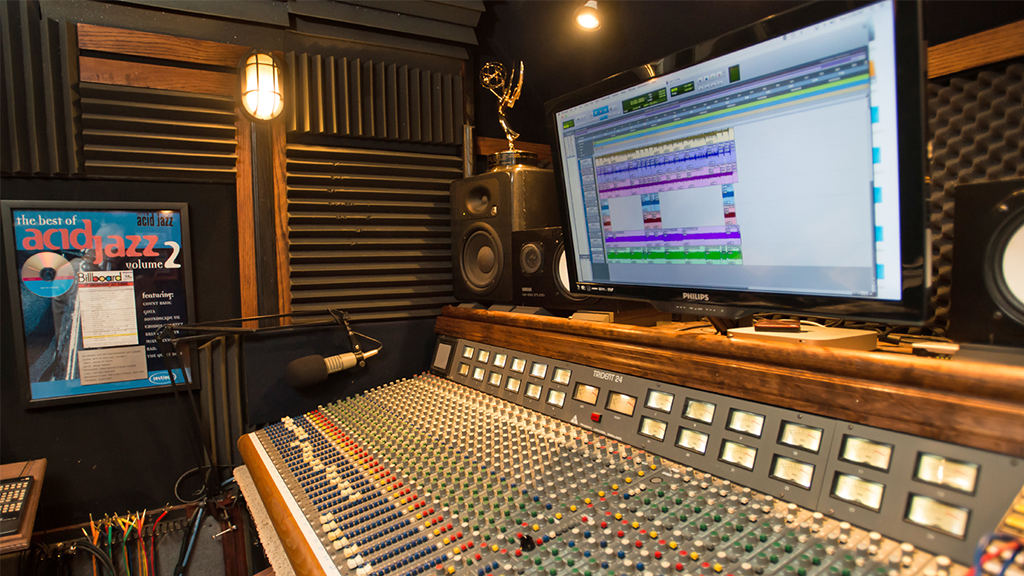
Brian: Back in the day, I used to cut & edit tape a lot, but for this album, I initially cut the basic tracks of drums, bass, and rhythm guitars on 2" analog tape. Then I transferred all the tracks to digital format to edit and fly in the guest solos.
You prefer recording live and minimizing the use of digital magic. Why?
Brian: Well, for me, analog tape has the magic I want. I know the younger generation likes to record their parts all separately in their own spaces, but I think it truly depends on the music you are recording. For instance, when I'm recording rock tracks, I want us all to be in the same room to perform together so we can vibe off each other while I'm cutting to tape. Otherwise, it becomes so sterile and contrite. Unconvincing and unauthentic to my ears. Now, on the other hand, if I'm recording lofi tracks, it doesn't matter who's in the room because this is a heavily based electronic computer music. Although, I like to inject live drum & Rhodes piano performances in my lofi tracks to give them more dimension.
What started your passion for helping our service men and women?
Brian: I have always had a special spot in my heart for military veterans. I feel they have always been forgotten in our world and taken for granted. I remember seeing homeless Vietnam veterans living in the subway and streets of New York City, where I grew up in the 70s. It was a disgraceful site because, at that time, no one seemed to care about veterans. So, I wanted to draw as much attention as I could to veterans' needs, and what better way than through music? I also wanted a very reliable benefit to donate to, so I did a lot of research and decided on the Fisher House Foundation.
My father was a World War II veteran serving in the South Pacific from 1943-1946, along with millions of other soldiers. He told many stories of his comradery with his fellow marines and how they all looked forward to the GI Bill. So, in college back in the 80s, I joined the ROTC (Reserve Officers' Training Corps) for a while, serving a short stint in the military and doing basic training at Fort Knox. Even though I didn't stay in the service, I always had a deep respect for the men and women who serve.
Tell us about Fisherhouse.org?
Brian: It's a wonderful organization that really cares about veterans. It was started by patriot and philanthropist Zachary Fisher. They build comfort homes where military & veteran families can stay free of charge while a loved one is in the hospital. They have helped over 430,000 families since the first doors opened in 1991. Fisher House has given scholarship awards to 15,000 students totaling $27,000,000. They also have a program called Hero Miles where over 70,000 airline tickets are provided to service members and their families, worth nearly $105 million.
What are the major issues facing our veterans today?
Brian: I think some of the issues today are issues that have always plagued veterans, such as post-traumatic stress disorder, depression, anxiety, substance abuse, and health issues. Homelessness is one of the end results of some of these issues and is heartbreaking because these men and woman have put their lives on the line to keep us all safe at home.
How can we help?
Brian: Probably the most effective way is to find a reliable organization that really takes the majority of the donations and appropriates it to veterans. I had to do a careful search of the organization because you won't believe how many simply don't properly distribute donations to the veterans. Another way would be to volunteer time at the VA or other reputable organizations that are dedicated to helping veterans. You can also donate here: https://connect.fisherhouse.org/campaign/BROTHERS-IN-ARMS
How did you get into production music?
Brian: One of my first jobs in the music industry was being an assistant engineer at a fast-paced jingle house on 5th avenue in New York City. This is where I discovered my whole career of being a commercial composer for film and television. Through the jingle house, I met a production company that was getting into the music production business. At the time, I had a number of guitar instrumental songs already mixed on a DAT. I suppose the timing was right because they had a relationship with a music producer at the CBS 1992 Olympics. So, the next thing I knew, my music was on the Olympics. I moved to Los Angeles and started to compose more songs for their library, and lo and behold, I turned on the TV one day and heard my song as a promo for the huge hit show Beverly Hills 90210 starring Shannen Doherty. It was a real kick at the time because I used to party with her and other celebrities at On the Rocks, above The Roxy Theatre on Sunset – across the street from APM!
Also, because I was recording hit contemporary jazz records as a solo artist in the 90s, I found that I was being hired as a composer by large libraries. They wanted to bring me into the fold because my production was at a higher level than the usual people they were using. It really just started to snowball, and I began composing for various Film and TV shows directly.
Production music used to be the "B-side" of music production, but it has become super cool. What changed that?
Brian: Oh yeah! Man, ain't that the truth? When I first started composing for production libraries, it was considered the "red-headed stepchild" of the music industry. No one took it seriously, and the record industry completely snubbed its nose at it. I remember speaking with a producer over at Warner Chappell publishing, and he was so critical of television music that it was shocking. But on the other hand, looking back, it was a wide-open field for composers.
I think what changed was a culmination of different ingredients that transpired in the past 20-plus years. For one thing, the record industry underwent a huge crash with the end of physical stores when Tower closed in 2006, not to mention the initiation of internet sales and streaming. Of course, the quality of production music in the past two decades has increased tremendously as well. Also, directors, producers, music supervisors, and editors have become much more music minded and hipper in their musical choices. It's a whole new world from when I started, and it is great to see!
If there's one film or TV show you want your music to be synced to, what would it be, which song, and why?
Brian: Film: Indiana Jones and the Dial of Destiny. Song: Hounds of Hell featuring Johannes Weik & The Budapest Orchestra
Why: I'm a huge Harrison Ford fan and love the Indiana Jones series and would love to see this song in particular synced up because it is a very dramatic tune accented by the wonderful live Budapest String Orchestra. I used my hand-made SG to conjure up mystical sounds from days of old, harkening to those distinct tones of Jimmy Page.
You played with some of the best musicians in the world on this album, including Satriani, Bumblefoot, Alex De Rosso, Travis Stever and more. Can you share a story/anecdote or two detailing your collaboration with them?
Brian: I have to say, hands down, it was a real gas to work with Joe Satriani, as he is one of my influences. He certainly paved the way for fusion guitar instrumentals. I have an NPR radio show called Guitar Trax on WFIT 89.5FM in Florida. I interviewed Joe a couple of times in the past for the show, and we hit it off, so I asked him if he would be willing to guest on a track for "Brothers in Arms." I wanted to compose something special for him and for the album to give the listener a real treat. So, as I was composing "Speed of Sound," I imagined a scene in the deserts of Iraq where the skies were blackened by a storm as American troops were lost in the valley of death trying to get back to safety. I wanted to paint a feeling not only of great aggression but also a scene of desperation and dramatic emotions. Sure enough, Joe really liked the track, and within two weeks he sent me back the final solo you here in the song.
Luxor was a particularly fun song that I wrote on the bass guitar before the Pandemic. I enlisted my longtime friend Reggie Pryor to record drums. We set up my Ludwig John Bonham drum set in a live room in my house in Florida. The opening riff (which repeats during the middle breakdown) was originally a bass riff, but I thought Ron 'Bumblefoot' Thal could do justice to it on the guitar, as you hear in the final version. I was going for that classic Iron Maiden vibe from Powerslave. I envisioned the ruins of the ancient Egyptian city of Thebes as the background for an epic battle. I wanted to evoke emotions of urgency and reciprocity of imposing forces, a theme of victory for American troops. I was very happy with Ron's solo bits and performances, which completed my overall vision.
Instrumental music is very difficult to get across to the general public because there are no words or lyrics that they can relate to in the track. I always like to make the music thematic, describing some sort of story to the listener. This helps a lot to keep their attention and interest in the song. I learned this craft during my Contemporary jazz solo artist days, seeing how people reacted to my music, both radio music directors and listeners.
Watch Brian Live at The WFIT Studio in Florida
Who are your biggest influences, and why?
Brian: Growing up in the '60s, 70s, and 80s, there was a plethora of great guitarists to choose from, and guitar music was king! I started out being really influenced by the British invasion guitarists as Eric Clapton, Jimmy Page & Jeff Beck, and then moved on to Jimi Hendrix. Third Stone From The Sun was unreal and really spoke to me because I was immediately attracted to instrumental guitar music. I always loved Jimmy Page's tone and solo in the middle of "Hearbreaker" it was the "Eruption" of the day.
When Jeff Beck came out with his fusion solo albums Blow By Blow, Wired & There and Back I knew that was my path in life. But when I heard Jeff Beck Live with the Jan Hammer Group, that was one of the best moments. Jeff's tone on that album is the best I have ever heard him. Live songs like "Freeway Jam," "Blue Wind," and "Full Moon Boogie" are trail-blazing performances by Jeff. In fact, I recently had the honor of working with the violinist on that album Steve Kindler for an upcoming release. Steve was originally in Mahavishnu Orchestra and is on the "Visions of the Emerald Beyond" later replacing Jean Luc Ponty in the band.
Another big influence was Van Halen exploding onto the scene with that first album. Man, I still remember first hearing VH I and thought it was unreal how he got that massive tone, and his chops were mind-blowing. I spent my teenage years trying to emulate all those incredible Van Halen tones and licks. I also remember hearing one of those acetate records in Guitar Player magazine of Steve Vai's "Attitude Song" & "Blue Powder" for the first time, which was another moment of greatness with all of those fantastic harmonies and dive bombs. Of course, Joe Satriani showed me how to make rock instrumental music accessible to the masses. "Surfing with the Alien" what a great album! That really influenced me, laying out a road map for being creative and popular.
If there's one guitar solo that you wish you did, what would it be?
Brian: Eruption
Is the classic idea of a "Rockstar," with all the excesses, fame, and power, dead? If so, why and what happened?
Brian: SHRED'S NOT DEAD! No, but seriously folks, I believe those days are long gone forever for many reasons. For one, the music style of the world has changed completely now. We live in George Orwell's futuristic world, whereby everything is programmed, and the government controls society. Today the younger generation has bought into the idea of making music on their iPhones and laptops using premade musical loops and plug-ins to alter their vocals. Cut and paste, hit the space bar, alter performances – all this has changed the way people create music. If you want to call it creating. Somehow it seems no one wants to practice actual instruments any longer, as society's attention span has grown ridiculously short. So, the end result is less than star quality and very unforgettable. Hence, no more Rock Star caliber performances, recordings, or tours.
I think you also have to remember that guitar ruled the airwaves from the dawn of Rock n Roll of Buddy Holly to Pearl Jam. It spoke to me and my generation of Baby Boomers but doesn't connect with the Millennials and Zoomers. They have their own thing, which is cool, even though I may not dig it. Here's a perfect example, I once played my daughter "Stairway to Heaven," and she turned to me and said, "it's too long and boring." I thought to myself, "where have I gone wrong."
Rock music used to be young people's music. It doesn't look like it anymore. Why?
Brian: Yeah, Man, don't I know it. Rock was the voice of my generation, loud guitars, driving drums, thumping bass, and screaming vocals. Through our music, we told everyone to F**K OFF! It was the music of a generation of rebellion. Look at the original Woodstock! Now to generations Y & Z, it is their grandparents' music, and it's no longer hip to the young. But to be fair, I think every generation goes through this because my dad being from the Big Band generation, could not figure out why I was listening to rock. In turn, his parents couldn't understand why he was listening to swing jazz.
Here's a really funny story. In the late 70s, when I was a teenager, I was in a band and had Led Zeppelin, The Who, and The Stones posters on my walls. My dad came into my room one day and said to me, "you should take up the clarinet. It's easier to carry, and you won't have to lug around your amp and guitar to gigs." You had to know my dad, he loved Benny Goodman, and my dad was a radio disc jockey from the 40s, so to him, it was a logical suggestion. It just struck me hilariously because even if I wanted to play the clarinet, none of the contemporary bands even had a horn in them, let alone a clarinet.
Any advice to aspiring composers and musicians?
Brian: Yes, one of the best attributes you can have is persistence and motivation. Also, prepare for a lot of rejection. It's just the name of the game. To be in this industry, you have to be very thick-skinned and not be discouraged from criticism. Listen, everyone knows there is always a better musician, actor, writer, or composer in the world than themselves, but there is such a thing as timing. We all have heard music at some time in our lives and thought, "man, I can do that better," but that's not the point. It's the fact that the other guy got the gig – right place, right time.
Another important factor is to know the music business and understand how musicians, composers, etc., are paid. Early in my career, I worked at record companies in radio promotions, finance, and business affairs and learned the business inside out. I was hungry for knowledge on how to make money from being a recording artist and composer. So, I understand cross-collateralized royalties, recoupment, and reserves being held. I always thought if you are going to be an artist in this industry, you should be required to work in it for at least a year before you sign any kind of deal. That way, you are well informed about any decision you make regarding signed agreements. I even wrote a couple of books on the topic, "Insider's Guide To Music Licensing" (Allworth Press) and "Survival Guide For Music Composers" (Hal Leonard). The whole reason I wrote them is I found most music business books were written by lawyers and are written very pretentiously. So, I wanted to write one in plain simple English terms for the average musician. At the end of the day, contrary to popular belief, success is not equated to being the best or the fastest gun. It's about being there at the time they need your talent. That's why I say "Tenacity" is your best weapon!
So are guitar groups out? Were those guys at Decca right all along? One listen to Brian's Brothers in Arms and all of his records with APM is enough to assure everyone that guitar music is here to stay.
Check out some of Brian's albums in the APM Catalog below.
Guitar Emotions – Brian Tarquin, Steve Morse (Deep Purple), Chuck Loeb (FourPlay)

